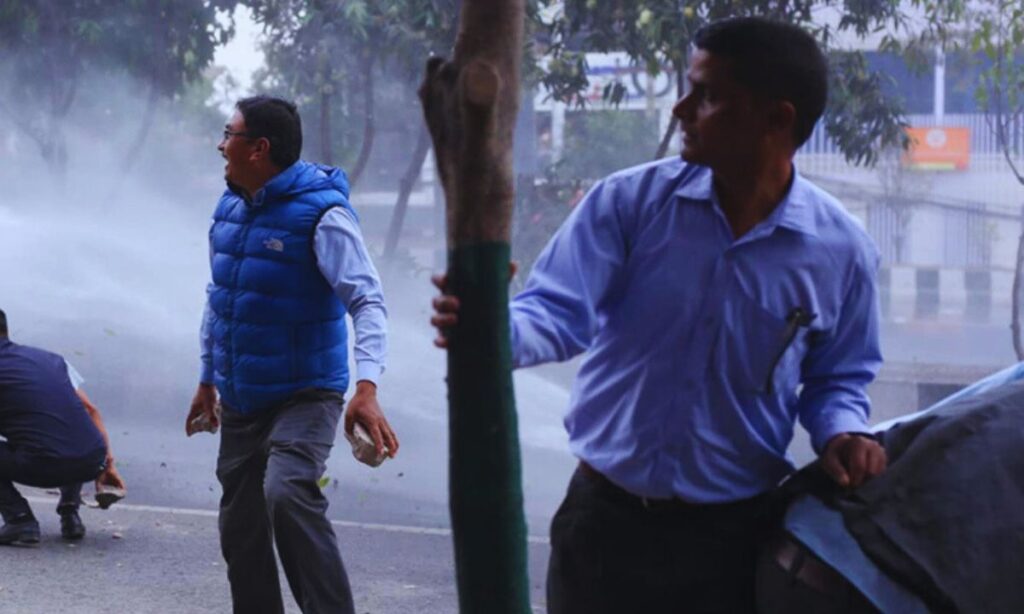- REALM //What’s happening
- WAVE //Culture beat
- Music
- OpinionTransform your living spaces with inspiration, tips, and trends in interior design. From minimalist decor to bold statements, find ideas for every style and budget.
- Social MediaNews on Facebook, Instagram, X (Twitter), TikTok, Snapchat, Threads, etc. – Platform-specific updates and controversies. Influencer trends – Who’s going viral, and why. Platform updates & features – Algorithm tweaks, UI changes, etc. Social media marketing tips – Strategies for brands and creators. A must-have category for Gen Z audiences and digital culture followers.
- Entertainment
- IshowSpeed @ The Kirib
If it’s Speed, we’re on it.Welcome to the wildest corner of The Kirib, where everything is 100% IShowSpeed — unfiltered, chaotic, legendary. We’re talking viral freakouts, sus moments, football (yes, we mean soccer), barking, yelling, random dances, and Speed being Speed. Whether he’s live-streaming games, dropping music, or meeting Ronaldo (literally), we’re covering every move.
Stream recaps
Gaming chaos
Music drops
Global tour content
Meme-worthy clips
Speed lore, start to now This is your one-stop zone to keep up with the king of unhinged content. If Speed’s trending, it’s already here. Don’t blink.
- CRAVE //Life’s flavor
- FoodySavor the world of culinary delights with news, recipes, and food trends. From gourmet dishes to comfort food, indulge in the flavors that bring people together.
- LifestyleExplore stories and advice on living your best life. From personal growth to entertainment, dive into the latest in lifestyle trends and inspiration.
- Health TipsStay informed about health and wellness with expert advice, fitness tips, and the latest medical breakthroughs. Your guide to a healthier and happier life.
- WIRED //Signals of now
- StartupsNew tech companies – Coverage on emerging businesses and cool new ideas. Funding rounds – Reports on who’s investing in which startup. Incubators/accelerators – Stories from Y Combinator, Techstars, and others. Founder interviews – Insightful chats with the people behind the tech. Focuses on early-stage innovation, entrepreneurship, and the business side of tech creation.
- Gaming
- Green TechSustainable innovations – Greener solutions in daily tech. Electric vehicles – From Tesla to two-wheelers. Solar & clean energy tech – Advances in renewable energy. Highlights environmentally friendly technology shaping the future.
- Tech BusinessBig Tech (Apple, Google, Meta, etc.) – Corporate strategies and leadership. Mergers & acquisitions – Who’s buying whom. Market trends – Stocks, earnings, and business moves. Tech stocks & IPOs – Valuation and investment angles. Takes a business lens on tech developments and industry movements.
- Apps & SoftwareApp launches and reviews – First looks, ratings, and real-world testing. Productivity tools – Apps that boost work and personal efficiency. Social media tools – Analytics, schedulers, and growth platforms. Updates to existing platforms – Major feature changes or UI overhauls. Covers the ever-growing world of applications that power our daily digital lives.
- AI & InnovationChatGPT, Google Gemini, etc. – Deep dives into trending AI tools. AI tools for creators – Helping writers, artists, and editors. Robotics & automation – Cool robots and smart factories. Research & futuristic tech – Sci-fi-level innovation becoming reality. Where bleeding-edge meets practical utility — future tech made now.
- Gadgets & DevicesSmartphones, laptops, wearables – Launches, leaks, and hands-on reviews. Reviews & comparisons – Which device is best, and why? Launch events (Apple, Samsung, etc.) – Coverage of major tech product events. Focuses on the hardware and tools that define the modern tech lifestyle.
- REALM //What’s happening
- WAVE //Culture beat
- Music
- OpinionTransform your living spaces with inspiration, tips, and trends in interior design. From minimalist decor to bold statements, find ideas for every style and budget.
- Social MediaNews on Facebook, Instagram, X (Twitter), TikTok, Snapchat, Threads, etc. – Platform-specific updates and controversies. Influencer trends – Who’s going viral, and why. Platform updates & features – Algorithm tweaks, UI changes, etc. Social media marketing tips – Strategies for brands and creators. A must-have category for Gen Z audiences and digital culture followers.
- Entertainment
- IshowSpeed @ The Kirib
If it’s Speed, we’re on it.Welcome to the wildest corner of The Kirib, where everything is 100% IShowSpeed — unfiltered, chaotic, legendary. We’re talking viral freakouts, sus moments, football (yes, we mean soccer), barking, yelling, random dances, and Speed being Speed. Whether he’s live-streaming games, dropping music, or meeting Ronaldo (literally), we’re covering every move.
Stream recaps
Gaming chaos
Music drops
Global tour content
Meme-worthy clips
Speed lore, start to now This is your one-stop zone to keep up with the king of unhinged content. If Speed’s trending, it’s already here. Don’t blink.
- CRAVE //Life’s flavor
- FoodySavor the world of culinary delights with news, recipes, and food trends. From gourmet dishes to comfort food, indulge in the flavors that bring people together.
- LifestyleExplore stories and advice on living your best life. From personal growth to entertainment, dive into the latest in lifestyle trends and inspiration.
- Health TipsStay informed about health and wellness with expert advice, fitness tips, and the latest medical breakthroughs. Your guide to a healthier and happier life.
- WIRED //Signals of now
- StartupsNew tech companies – Coverage on emerging businesses and cool new ideas. Funding rounds – Reports on who’s investing in which startup. Incubators/accelerators – Stories from Y Combinator, Techstars, and others. Founder interviews – Insightful chats with the people behind the tech. Focuses on early-stage innovation, entrepreneurship, and the business side of tech creation.
- Gaming
- Green TechSustainable innovations – Greener solutions in daily tech. Electric vehicles – From Tesla to two-wheelers. Solar & clean energy tech – Advances in renewable energy. Highlights environmentally friendly technology shaping the future.
- Tech BusinessBig Tech (Apple, Google, Meta, etc.) – Corporate strategies and leadership. Mergers & acquisitions – Who’s buying whom. Market trends – Stocks, earnings, and business moves. Tech stocks & IPOs – Valuation and investment angles. Takes a business lens on tech developments and industry movements.
- Apps & SoftwareApp launches and reviews – First looks, ratings, and real-world testing. Productivity tools – Apps that boost work and personal efficiency. Social media tools – Analytics, schedulers, and growth platforms. Updates to existing platforms – Major feature changes or UI overhauls. Covers the ever-growing world of applications that power our daily digital lives.
- AI & InnovationChatGPT, Google Gemini, etc. – Deep dives into trending AI tools. AI tools for creators – Helping writers, artists, and editors. Robotics & automation – Cool robots and smart factories. Research & futuristic tech – Sci-fi-level innovation becoming reality. Where bleeding-edge meets practical utility — future tech made now.
- Gadgets & DevicesSmartphones, laptops, wearables – Launches, leaks, and hands-on reviews. Reviews & comparisons – Which device is best, and why? Launch events (Apple, Samsung, etc.) – Coverage of major tech product events. Focuses on the hardware and tools that define the modern tech lifestyle.
- News//
- News//
- Music//
- World//Explore stories, events, and insights from across the globe. Stay updated on international affairs, cultural highlights, and impactful moments that connect us all in the world we share.
- Foody//Savor the world of culinary delights with news, recipes, and food trends. From gourmet dishes to comfort food, indulge in the flavors that bring people together.
- Gaming//
- Lifestyle//Explore stories and advice on living your best life. From personal growth to entertainment, dive into the latest in lifestyle trends and inspiration.
- Health Tips//Stay informed about health and wellness with expert advice, fitness tips, and the latest medical breakthroughs. Your guide to a healthier and happier life.
- Entertainment//
- Opinion//Transform your living spaces with inspiration, tips, and trends in interior design. From minimalist decor to bold statements, find ideas for every style and budget.
- Pop Culture//
- Sports//
- Technology//
- Startups//New tech companies – Coverage on emerging businesses and cool new ideas. Funding rounds – Reports on who’s investing in which startup. Incubators/accelerators – Stories from Y Combinator, Techstars, and others. Founder interviews – Insightful chats with the people behind the tech. Focuses on early-stage innovation, entrepreneurship, and the business side of tech creation.
- Green Tech//Sustainable innovations – Greener solutions in daily tech. Electric vehicles – From Tesla to two-wheelers. Solar & clean energy tech – Advances in renewable energy. Highlights environmentally friendly technology shaping the future.
- Social Media//News on Facebook, Instagram, X (Twitter), TikTok, Snapchat, Threads, etc. – Platform-specific updates and controversies. Influencer trends – Who’s going viral, and why. Platform updates & features – Algorithm tweaks, UI changes, etc. Social media marketing tips – Strategies for brands and creators. A must-have category for Gen Z audiences and digital culture followers.
- Tech Business//Big Tech (Apple, Google, Meta, etc.) – Corporate strategies and leadership. Mergers & acquisitions – Who’s buying whom. Market trends – Stocks, earnings, and business moves. Tech stocks & IPOs – Valuation and investment angles. Takes a business lens on tech developments and industry movements.
- AI & Innovation//ChatGPT, Google Gemini, etc. – Deep dives into trending AI tools. AI tools for creators – Helping writers, artists, and editors. Robotics & automation – Cool robots and smart factories. Research & futuristic tech – Sci-fi-level innovation becoming reality. Where bleeding-edge meets practical utility — future tech made now.
- Apps & Software//App launches and reviews – First looks, ratings, and real-world testing. Productivity tools – Apps that boost work and personal efficiency. Social media tools – Analytics, schedulers, and growth platforms. Updates to existing platforms – Major feature changes or UI overhauls. Covers the ever-growing world of applications that power our daily digital lives.
- Gadgets & Devices//Smartphones, laptops, wearables – Launches, leaks, and hands-on reviews. Reviews & comparisons – Which device is best, and why? Launch events (Apple, Samsung, etc.) – Coverage of major tech product events. Focuses on the hardware and tools that define the modern tech lifestyle.
- IshowSpeed @ The Kirib
//If it’s Speed, we’re on it.Welcome to the wildest corner of The Kirib, where everything is 100% IShowSpeed — unfiltered, chaotic, legendary. We’re talking viral freakouts, sus moments, football (yes, we mean soccer), barking, yelling, random dances, and Speed being Speed. Whether he’s live-streaming games, dropping music, or meeting Ronaldo (literally), we’re covering every move.
Stream recaps
Gaming chaos
Music drops
Global tour content
Meme-worthy clips
Speed lore, start to now This is your one-stop zone to keep up with the king of unhinged content. If Speed’s trending, it’s already here. Don’t blink.
Real news. Real Culture. Zero fluff.
The Kirib brings you the stories that matter — No clickbait. No noise.
Bold, smart reporting for curious minds.
News7 hours ago
Raute Chief Suryanarayan Shahi Passes Away
Suryanarayan Shahi, the chief of the endangered Raute community who live a nomadic life in the forest, has passed away. He died on Monday night around 9:30 PM. Lal Bahadur
News12 hours ago
- 01
News7 hours ago
Raute Chief Suryanarayan Shahi Passes Away
Suryanarayan Shahi, the chief of the endangered Raute community who live a nomadic life in the forest, has passed away. He died on Monday night around 9:30 PM. Lal Bahadur
- 02
News11 hours ago
Australian Climber Dies After Ama Dablam Ascent
An Australian climber has died while returning from climbing Mount Ama Dablam in Solukhumbu. According to Himal Gautam, Director at the Department of Tourism, the climber was Martin Hornegger, who
- 03
News12 hours ago
Two Boys Drown in Mahottari Pond
Two boys have died after drowning in a pond in Mahottari. One of the boys was from Mahottari and the other from Saptari, according to police. The incident happened at
12 hours ago
Two Boys Drown in Mahottari Pond
16 hours ago
Woman Sets Herself on Fire in Balaju, Kathmandu
16 hours ago
Body of Missing Boy Found Buried in Banke Field
16 hours ago
Man Arrested After Killing His Wife in Myagdi
Trending
News12 hours ago
Two Boys Drown in Mahottari Pond
Culture and Lifestyle
Sports3 days ago
Ananta Tamang Could Make History Again
If Lalitpur City FC wins the Nepal Super League (NSL) final on Saturday, captain Ananta Tamang will make history. He also led Lalitpur to win the second season of the
News7 hours ago
Raute Chief Suryanarayan Shahi Passes Away
Suryanarayan Shahi, the chief of the endangered Raute community who live a nomadic life in the forest, has passed away. He died on Monday night around 9:30 PM. Lal Bahadur
News11 hours ago
Australian Climber Dies After Ama Dablam Ascent
An Australian climber has died while returning from climbing Mount Ama Dablam in Solukhumbu. According to Himal Gautam, Director at the Department of Tourism, the climber was Martin Hornegger, who
News12 hours ago
Two Boys Drown in Mahottari Pond
Two boys have died after drowning in a pond in Mahottari. One of the boys was from Mahottari and the other from Saptari, according to police. The incident happened at
News3 days ago
25-Year-Old Nepali Dies in Portugal
A young man from Kawasoti-16, Danda, in eastern Nawalparasi, has died while working in Portugal. 25-year-old Bijay Pariyar passed away in a hospital during treatment, according to his family. Pariyar
News4 days ago
Viral Traffic Police Beating Videos Found to Be Old
Since Thursday, two videos of traffic police beating civilians have gone viral on social media. Both videos are old. The first video, which shows four traffic police officers near the Sundhara
News4 days ago
Five Injured in Force Vehicle Accident in Salyan
A Force vehicle (plate LU 2 Kha 6271) traveling from Rukum West to Tulsipur, Dang, crashed on the Rapti Highway near Dharapani in Bagchaur Municipality–5, Salyan, around 10:00 AM on
Technology
News4 days ago
Two Dead after fall from Cliff in Dolpa
Two people died after falling off a cliff in Dolpa district. The accident happened on the road between Tipla and Tatopani in Thuli Bheri Municipality–4. The victims were 33-year-old Parbati
Security
News7 hours ago
Raute Chief Suryanarayan Shahi Passes Away
Suryanarayan Shahi, the chief of the endangered Raute community who live a nomadic life in the forest, has passed away. He died on Monday night around 9:30 PM. Lal Bahadur
Weather Update: Light to Moderate Rain Likely Until Tuesday
The Department of Hydrology and Meteorology has said there is a chance of light to moderate rain until next Tuesday. Light rain that started across the country on Sunday, along



































